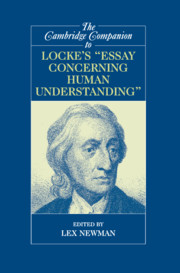Book contents
- Frontmatter
- Introduction
- 1 The Intellectual Setting and Aims of the Essay
- 2 Locke’s Polemic against Nativism
- 3 The Taxonomy of Ideas in Locke’s Essay
- 4 Locke’s Distinctions between Primary and Secondary Qualities
- 5 Power in Locke’s Essay
- 6 Locke on Substance
- 7 Locke on Ideas of Identity and Diversity
- 8 Locke on Ideas and Representation
- 9 Locke on Essences and Classification
- 10 Language, Meaning, and Mind in Locke’s Essay
- 11 Locke on Knowledge
- 12 Locke’s Ontology
- 13 The Moral Epistemology of Locke’s Essay
- 14 Locke on Judgment
- 15 Locke on Faith and Reason
- Bibliography
- Index of Names and Subjects
- Index of Passages Cited
1 - The Intellectual Setting and Aims of the Essay
Published online by Cambridge University Press: 28 July 2007
- Frontmatter
- Introduction
- 1 The Intellectual Setting and Aims of the Essay
- 2 Locke’s Polemic against Nativism
- 3 The Taxonomy of Ideas in Locke’s Essay
- 4 Locke’s Distinctions between Primary and Secondary Qualities
- 5 Power in Locke’s Essay
- 6 Locke on Substance
- 7 Locke on Ideas of Identity and Diversity
- 8 Locke on Ideas and Representation
- 9 Locke on Essences and Classification
- 10 Language, Meaning, and Mind in Locke’s Essay
- 11 Locke on Knowledge
- 12 Locke’s Ontology
- 13 The Moral Epistemology of Locke’s Essay
- 14 Locke on Judgment
- 15 Locke on Faith and Reason
- Bibliography
- Index of Names and Subjects
- Index of Passages Cited
Summary
The Essay Concerning Human Understanding, though dated 1690, was published in late 1689, when its author was fifty-seven. It had been completed in Holland, where Locke had fled in 1683. It had a much longer gestation than this suggests, however. When it was published it was the product of a mature philosophical mind that had been reflecting on the issues that it considers for nearly twenty years. Locke tells us in the “Epistle to the Reader” something of its origin and history. He writes that five or six friends:
Meeting at my chamber, and discoursing on a subject very remote from this [i.e., human understanding], found themselves quickly at a stand, by the Difficulties that rose on every side. After we had a while puzzled our selves, without coming any nearer a Resolution of those Doubts which perplexed us, it came in to my Thoughts, that we took a wrong course; and that, before we set our selves upon Enquiries of that Nature, it was necessary to examine our own Abilities, and see, what Objects our Understandings were, or were not fitted to deal with. This I proposed to the Company, who all readily assented; and thereupon it was agreed, that this should be our first Enquiry. Some hasty and undigested Thoughts, on a Subject I had never before considered, which I set down against our next Meeting, gave the first entrance into this Discourse, which having been thus by Chance, was continued by Intreaty; written by incoherent parcels, and after long intervals of neglect, resum'd again, as my Humour or Occasions permitted; and at last, in a retirement, where an Attendance on my Health gave me leisure, it was brought into that order, thou now seest it.
(E: 7)- Type
- Chapter
- Information
- Publisher: Cambridge University PressPrint publication year: 2007
- 2
- Cited by

